Baked potatoes are one of the few foods that you can enjoy year-round, during the work week, or on a special occasion. They’re simple, delicious, and beloved by nearly everyone. And, best of all, they’re nearly impossible to get wrong. The only thing you have to know is how long to let the potato bake in the oven.
A potato baked at 400° Fahrenheit should take about an hour to cook through. This varies depending on the size and type of potato, though, so it’s always best to check a few minutes before the hour is up. Poke the potato with a fork to see if it’s soft, and if so, it’s done. You can also give it a little squeeze with an oven mitt to see if it's ready to come out of the oven.
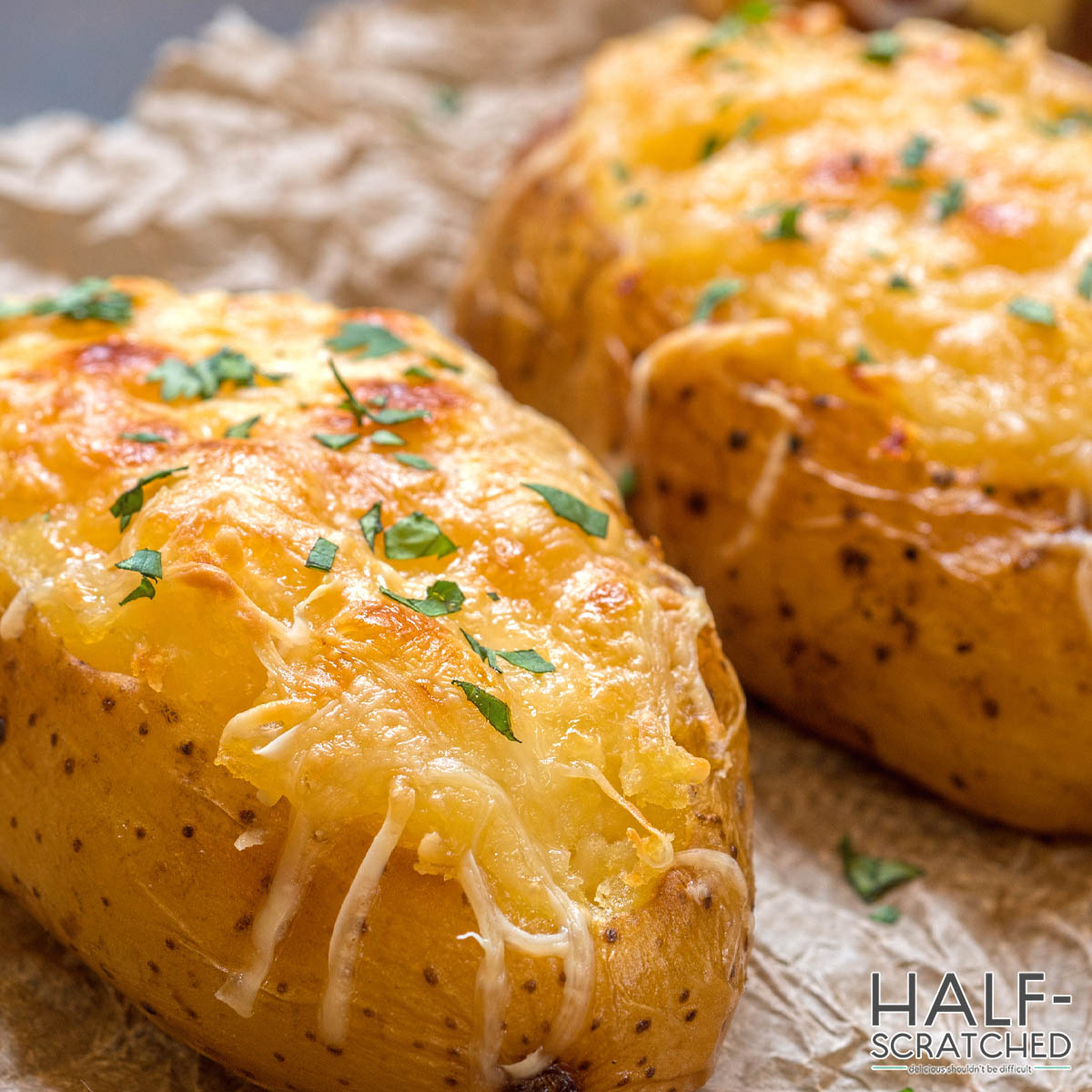
Understandably, there are a few variables you’ll have to consider and you can also use a few tricks to speed up the baking process. Keep reading to learn everything there is to know about baked potatoes and discover how you can perfect the art of a family favorite on the first try.
Why Temperature Matters When Baking Potatoes
Like any baked or roasted vegetable, baked potatoes are best enjoyed when cooked slowly at a moderate temperature. This allows the potato’s natural sugars to caramelize, giving the flesh a deep flavor and the skin a crispy texture.
Cooking baked potatoes too quickly in a roaring oven will cause the potato to dry out, creating a mealy flesh and a flabby skin. No one wants that. Conversely, cooking the potatoes too slowly at a low temperature will make it difficult to achieve the perfect balance between a crisp exterior and a fluffy potato interior.
Ideally, you should preheat your oven to 400° Fahrenheit and bake the potatoes for about an hour. This should be long enough to cook the potatoes through while still allowing the skin to crisp up. For extra-crispy skin, you can increase the oven temperature to 425° Fahrenheit. This will cause the potatoes to cook a little faster, so be sure to check them after 45 minutes.
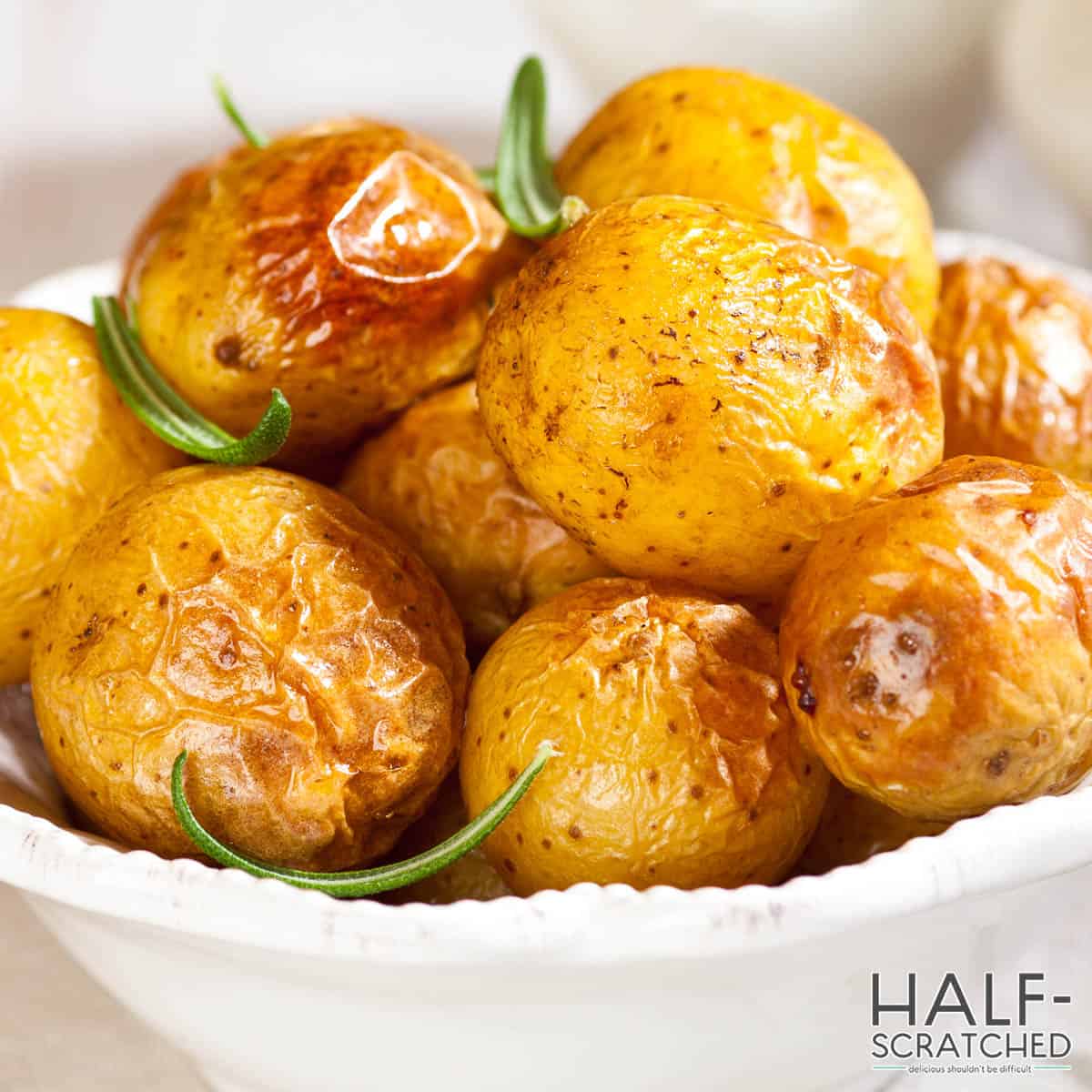
With Baked Potatoes, Size Matters
One of the most important things to consider when baking potatoes is the size of the potato. A small potato will cook faster than a large potato, so it’s important to adjust the baking time accordingly. As a general rule of thumb, a small potato should take about 45 minutes to bake at 400° Fahrenheit, while a large potato will take closer to an hour.
Again, it’s always best to check a few minutes before the baking time is up to ensure that the potato is cooked through. You can also cook multiple potatoes at the same time, which is a great way to feed a crowd. Just be sure to avoid overcrowding the baking area or increase the baking time by 10-15 minutes if you’re baking more than two potatoes.
Some Types of Potatoes Will Bake Faster
It’s also worth considering the type of potato you’re baking. While russets are the most popular potatoes for baking, there are a few other varieties that work just as well. For instance, Yukon golds are a great option for baking. They’re smaller in size and have thin skin that doesn’t need to be peeled. They also have a buttery flavor that pairs well with nearly any toppings.
Red potatoes are another good option for baking. Like Yukon golds, they’re a little smaller and have a beautiful red skin that’s edible. They’re also very moist, making them a good choice if you want a fluffy potato.
If you’re in a pinch, you can even use baby potatoes. These are small, bite-sized potatoes that don’t need to be peeled or cut and you can bake a large batch of them at once. Just be aware that they’ll cook faster than larger potatoes, so be sure to check them after 30 minutes.
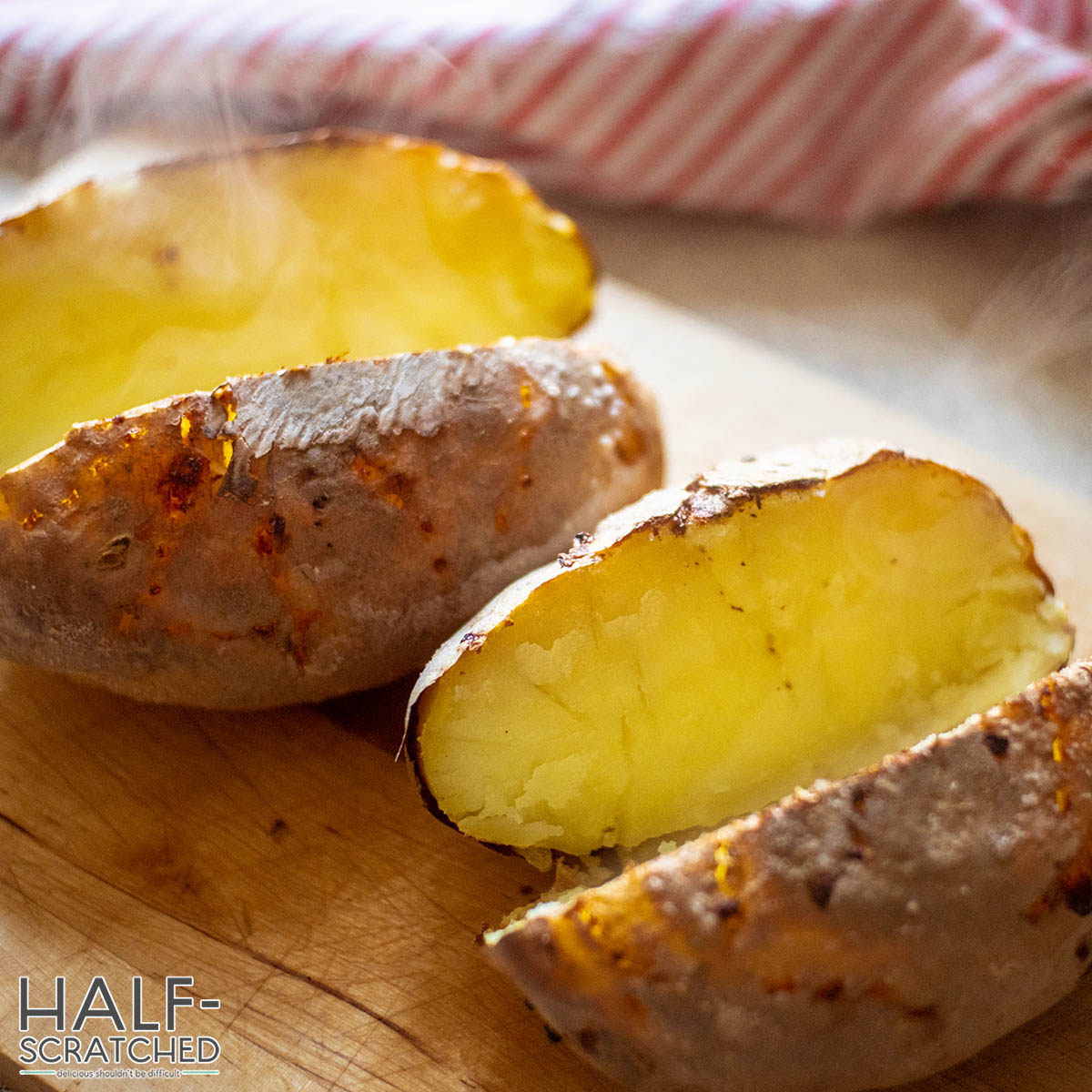
An Air Fryer Won’t Save You Much Time but These Tricks Will
If you’re short on time, you might be tempted to cook your potato in the microwave or air fryer. While both of these methods will cook the potato faster than the oven, they’re not necessarily the best option.
A potato cooked in the microwave will be softer and less flavorful than one that’s been baked. And, while an air fryer will give you a crispier skin, it’s not going to cook the potato through as quickly as the oven will. So, if you’re in a hurry, it’s best to stick with the oven.
If you’re really short on time, you can wrap the potatoes in aluminum foil before baking them. This will trap the potato’s natural moisture and steam, cooking the potato faster. Just be sure to unwrap the potato before serving so that the skin has a chance to crisp up.
Alternatively, you can poke a line of holes into the potato using a fork to help the heat penetrate the flesh. This will also help the potato cook faster, but it will also cause the potato to lose some of its natural moisture. So, if you go this route, be sure to bake the potato for a minute or two longer than you would otherwise.
You can also bake the potato ahead of time when you’re a little less busy. Just bake the potato as you would normally and then store it in the fridge. When you’re ready to eat, reheat the potato in the oven or microwave. This won’t give you the same crispy skin as a freshly baked potato, but it will still taste delicious.
My Personal Tricks to Improve Your Baked Potatoes
Beyond the basic baking times and the type of potatoes you use, you can actually do a lot with baked potatoes to improve the final result. If you haven’t tried any of the following tips before, we highly recommend checking them out and applying them as you see fit.
Oil the Potatoes in the Last 10 Minutes
Most baked potato recipes are as stripped back as possible, but if you want to achieve a truly crispy skin, we recommend adding a little oil to the equation. Just brush the potatoes with some olive oil or vegetable oil in the last 10 minutes of baking and they’ll come out of the oven with a beautiful, golden-brown skin.
Soak the Potatoes Before Baking
Soaking the potatoes in water before baking them might seem like a strange idea, but it actually works. Soaking the potatoes helps to remove some of the starch, which gives the potatoes a fluffier, less dense texture. Just be sure to thoroughly dry the potatoes before baking them or you’ll end up with soggy skin and a mushy interior.
Add Some Aromatics to the Potatoes
If you want to give your potatoes a little flavor boost, try adding some aromatics to the water you use to soak them. This could be anything from rosemary and thyme to garlic and onion. Just be sure to remove the aromatics before baking the potatoes or they’ll end up burning in the oven.
Fully Coat the Potatoes in Salt
Salt baking is a specialized technique that’s often used to cook fish, but it also works wonders on potatoes. To salt-bake potatoes, you’ll need to fully coat them in salt before baking them. This might seem like a lot of salt, but it’s actually necessary to create a barrier that helps to prevent the potatoes from drying out. After baking, crack the exterior shell and brush away the unwanted salt.
Bake the Potatoes Twice
Baking the potatoes twice might seem like overkill, but it’s actually a great way to achieve a crispy skin. The first bake helps to cook the potatoes through, while the second bake gives the potatoes a chance to crisp up. Just be sure to let the potatoes cool for a few minutes before the second bake so that you don’t end up with burnt skin.
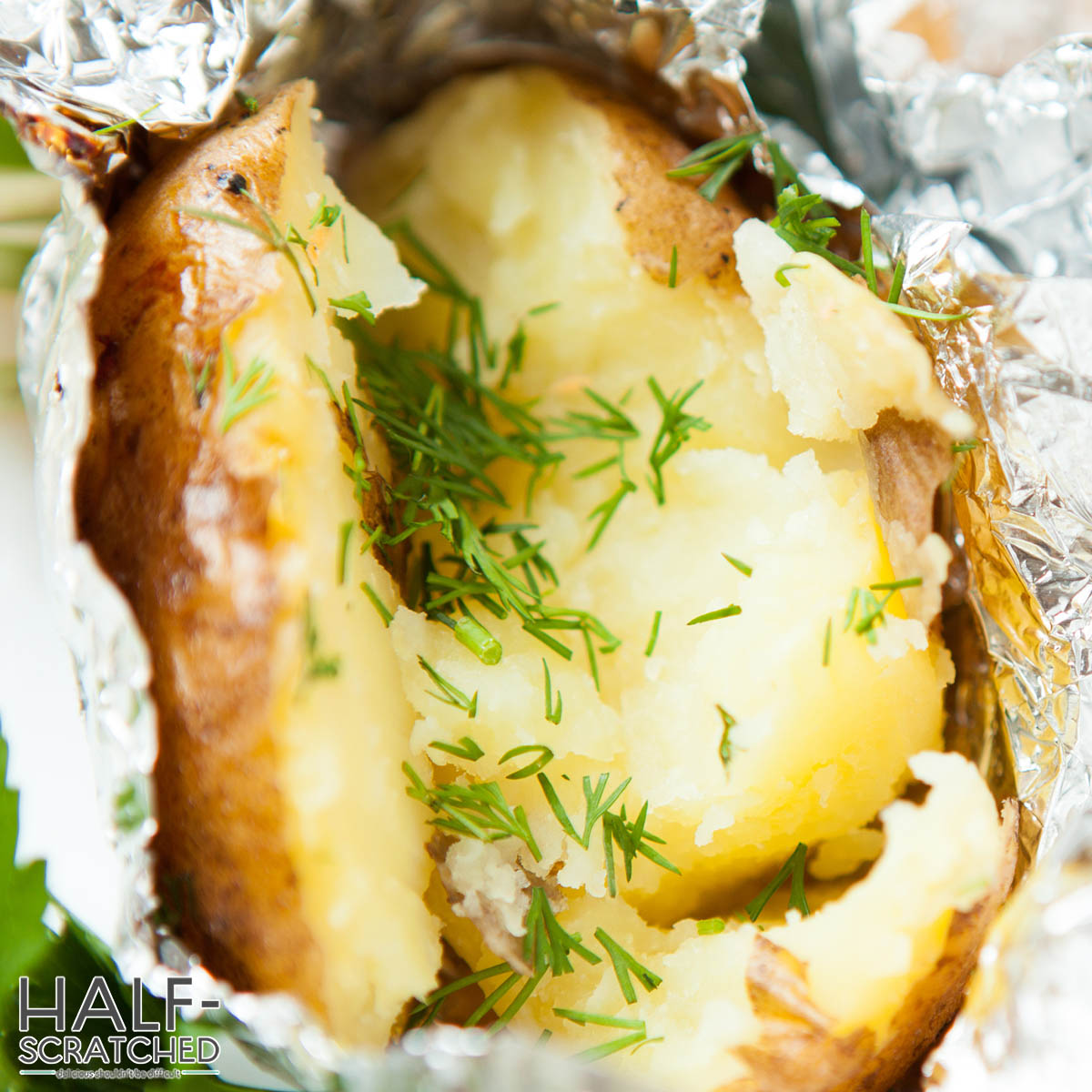
Frequently Asked Questions
The best way to keep your baked potatoes soft and fluffy is to wrap them in foil before storing them in the refrigerator. This will help to keep them moist and prevent them from drying out. You can also reheat the potatoes in the oven or microwave before serving to help them retain their moisture.
If your baked potatoes are watery and mushy, it’s likely because you didn’t soak them long enough or you didn’t dry them thoroughly before baking. Soaking the potatoes helps to remove some of the starch, which gives the potatoes a fluffier, less dense texture. Just be sure to soak the potatoes for at least ten minutes and thoroughly dry them before baking.
No, you don’t need to wrap your potatoes in foil before baking them. However, wrapping the potatoes in foil will help them to retain their moisture, resulting in a soft and fluffy potato. If you’re looking for a crispy skin, we recommend brushing the potatoes with some olive oil in the last few minutes of baking them.
There are a few vegan-friendly substitutes you can use in place of cheese and sour cream. For the cheese, you can try vegan cheese or dairy-free yogurt. For the sour cream, you can use a vegan-friendly sour cream or dairy-free yogurt. Just be sure to check the labels to make sure the product is vegan.
If you cut the potatoes in half before baking them, they’ll cook a little faster. Just be sure to check them after 30 minutes to make sure they’re cooked through. You can also wrap the potatoes in foil to help them retain their moisture and prevent them from drying out.
Our Favorite Recipe for Fully Loaded Baked Potatoes
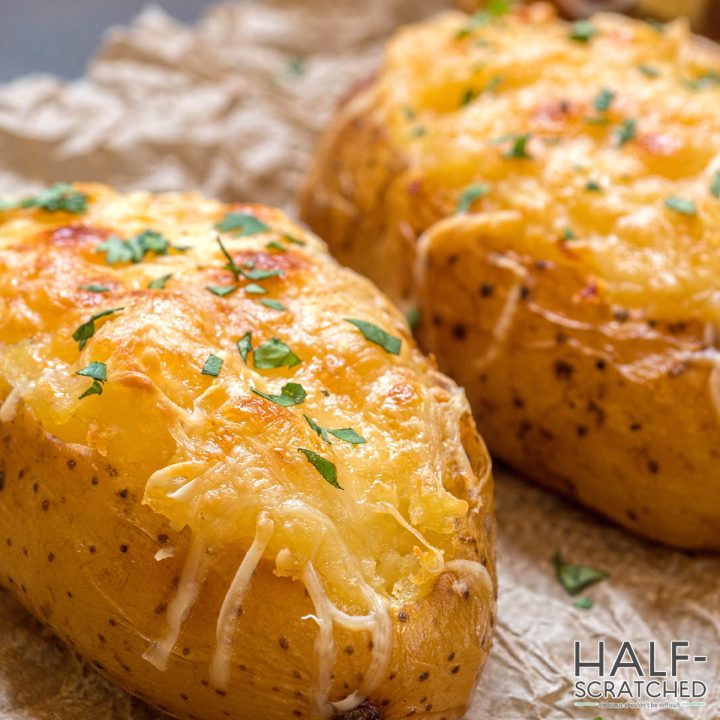
How Long to Bake a Potato at 400 F
As simple as baked potatoes may be, you can create a perfect family favorite by following these easy baking tips.
Ingredients
- 4 large russet potatoes
- 2 tablespoons of olive oil
- 1 teaspoon of salt
- ½ teaspoon of black pepper
- 1 cup of shredded cheddar cheese
- ½ cup of sour cream
- ½ cup of chopped chives
Instructions
- Preheat the oven to 400° Fahrenheit.
- Wash the potatoes and let them soak in warm water for at least ten minutes.
- After the potatoes have soaked and released some starch into the water, remove and dry them completely.
- Sprinkle the potatoes with salt and pepper.
- Bake the potatoes for 40 minutes to an hour or until they’re tender when pierced with a fork.
- Remove the potatoes from the oven and gently brush some olive oil onto the outer skin.
- Return the potatoes to the oven and let them bake for another 10 minutes to create a perfectly crispy skin.
- Cut the potatoes in half and scoop out the flesh, being careful not to break the skin.
- In a bowl, mix together the potato flesh, cheddar cheese, sour cream, and chives.
- Spoon the mixture back into the potato skins and return them to the oven.
- Bake the potatoes for an additional 5 minutes or until the cheese is melted and bubbly.
- Serve immediately and enjoy!
Nutrition Information:
Yield: 4 Serving Size: 1Amount Per Serving:Calories: 523Total Fat: 22gSaturated Fat: 9gTrans Fat: 0gUnsaturated Fat: 10gCholesterol: 45mgSodium: 764mgCarbohydrates: 67gFiber: 7gSugar: 4gProtein: 15g
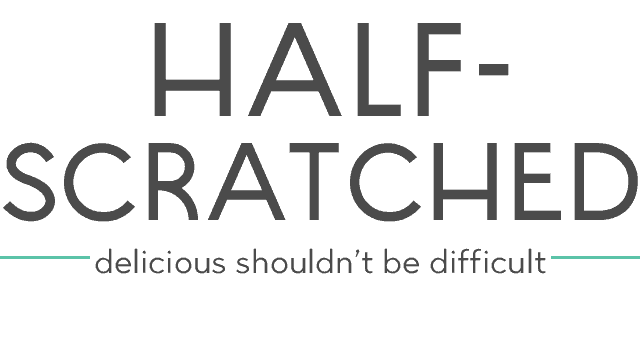

Leave a Reply